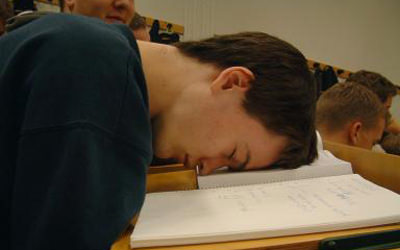The Iron Bars of Iron Deficiency
As an athlete or even just as a student, it’s important to know how to recognize iron deficiency and its symptoms.

Feeling like this? Maybe it’s time to get checked for anemia. Photo from the D’Arcy Lane Institute
May 8, 2018
As an athlete, it’s important to understand and be aware of the signals your body gives you. Any unusual pain, extreme fatigue, or trouble breathing should be addressed and discussed with your coaches, your athletic trainer, or possibly even a doctor. However, it’s also important to remember that ultimately, you know your body best and if something feels off, do not let a coach or doctor dismiss your concerns. Particularly in the case of female athletes, iron deficiency, also called anemia, is a major concern. Although it is less common, it can also affect male athletes so regardless of your gender, please see a coach or doctor if any of the following symptoms affect you.
- Extreme fatigue: This is the most common symptom of iron deficiency. It may be hard to recognize because most high school students exist in a state of perpetual exhaustion, but try to be aware of any extreme and unusual tiredness.
- Pale skin: This is due to a lack of red blood cells (which contain iron).
- Shortness of breath: The iron in red blood cells is instrumental in oxygen transport, so low iron may result in difficulty breathing during strenuous exercise. If you are affected by asthma, this symptom may be hard to differentiate from normal breathing problems. If you do not asthma however, an iron deficiency could very well be the cause.
- Dizziness: Dizziness is hard to pin down as a symptom of iron deficiency because so many other things could contribute to it: dehydration, lack of nutrition, or various other medical issues could also be the culprit. If dizziness persists, however, it is certainly worth getting checked out.
- Unusual cravings for non-nutritious substances: This particular symptom sounds strange, but if you develop a habit of eating ice, for example, it might be time to think about increasing your iron intake.
If you are experiencing any of the symptoms listed above, please inform your doctor or coach. Iron deficiency can affect athletic performance, making it difficult to keep up with your teammates and getting the results you know you are capable of. Your doctor might recommend you to be tested for anemia or for you to start taking iron supplements in order to ensure that you can complete the majority of your season competing at 100%.


Roman • May 8, 2018 at 2:43 pm
The title seems a bit extra.
Grant Stoughton • May 11, 2018 at 1:29 pm
Strange, it seemed like the perfect amount to us.